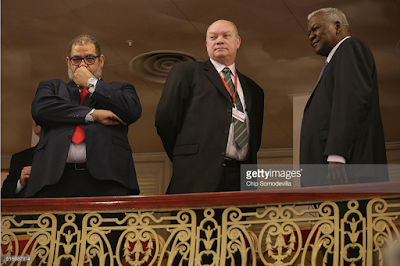Google has equipped the center with 20 Acer Chromebooks and a number of Nexus 5 phones and Cardboard viewers. Each Chromebook comes with 100 GB of cloud storage.
 |
| The man is in the wheelchair demonstrating Google Cardboard for the press. Kcho is on the left and Google's head of Cuba operations Brett Perlmutter is to his right. |
I have to admit that I find this disappointing for a couple of reasons.
First, it was widely reported that this center would provide connectivity for 40 simultaneous users at 70 times the speed of ETECSA's current public hotspots, but the article just says ETECSA has provisioned one of their access points at the studio. If that is the case and they limit access to 40 simultaneous users -- 20 using Chromebooks inside and 20 more using their own devices outside -- performance should be better than the other ETECSA hotspots, but the speed per user will be more like twice as fast than 70 times as fast.
The studio will be open to the public five days a week, from 7 a.m. to midnight. I guess Kcho will have the whole link to himself on weekends.
Still, even if it is no faster than a public hotspot, it will be free. That sounds good, but the lines waiting to get in will run the length of the Malecón. How will they ration access -- who will get in and for how long? Perhaps access will be reserved for professionals.
The article asks us to imagine how great it will be for the robotics faculty at CUJAE, a Cuban university, to hold a video conference call with researchers at the Alphabet-owned robotics company Boston Dynamics. Two problems -- that sounds a little patronizing and it has been reported that Boston Dynamics is up for sale.
I'm also disappointed in Google. They have developed and deployed amazing technology and are a huge company that has invested a lot in well-publicized trips to Cuba. Couldn't they have afforded to contribute their own high-end Pixel Chromebooks and Nexus 6 phones instead of Acer Chromebooks and Nexus 5 phones? And, how about a terabyte instead of 100 gig? It's not a big deal, but it feels cheesy given the hype surrounding the opening of the center.
There is too much kowtowing and hyperbole -- "Kcho's magic, Etecsa's megas and Google's technology have converted this place into the first connection point on the island, completely free for all Cubans." The article makes a Google Hangout on Air and Cardboard VR sound like cutting edge technology.
Another disappointment was Kcho and Leysi Rubio, head of the communications (press relations?) department, looking a gift horse in the mouth by taking pot shots at the US government and the "blockade." There is no suggestion that Cuban government fear or mistrust might impose any limitations.
Regardless, the valiant Kcho vowed to persevere -- he doesn't know how -- but, somehow, he will keep doing things. Good grief.
The press coverage of this project was also disappointing. A Google search for "Google Kcho" news turns up hundreds of articles on the project during the last few days. The story was covered in many nations and languages -- from Turkey's Daily Sabah (in English, Turkish or German) to the New York Times. The Internet tech press all jumped on the story.
I've only read a fraction of these stories, but they all have one thing in common -- they are either direct copies or paraphrases of the story published by the Associated Press after an exclusive tour of the facility on March 21, 2016. They even repeat a symmetric connection speed of 70 megabytes per second, which I suspect should be 70 megabits per second.
I would not be so disappointed if this were an isolated case, but I am afraid that click-supported Internet news may inevitably be superficial, redundant and concentrated.
I may have gotten some of this wrong, but it has the same publicity-stunt feeling as Kcho's first free hotspot. Let me know if you get online at the Google-Kcho center and your experience is different. I'd also be curious to know which, if any, of the Google Drive services are blocked in Cuba.
-----
Update 4/4/2015
Kcho is well connected. My friend Sam Lanfranco pointed me to this photo of Kcho (left) waiting with Foreign Trade and Investment Minister Rodrigo Malmierca and member of the Cuban Parliament Esteban Lazo Hernandez for the arrival of U.S. President Barack Obama at the Gran Teatro de la Habana Alicia Alonso.
-----
Update 4/18/2015
This report on the Google+Kcho Center clarifies the bandwidth question. The original AP story said connectivity would be 70 megabytes per second, leading to repeated assertions in the press that connectivity would be 70 times faster than the typical 1 megabit per second service at the 60 paid public access hotspots around the island.
It turns out that users were disappointed when they found that they had difficulty streaming YouTube videos.
Since there are only 20 simultaneous users in the center, it seems that Google+Kcho has the same backhaul speed as the other public access hotspots. The "70 megabytes" per second must actually be 70 megabits per second backhaul for the entire center, not for each user.
I don't know whether this misunderstanding was an intentional effort to mislead the public and perhaps even President Obama or just the Internet press copying what they had read in the AP story.
In addition to slow connections, it turns out that users are not allowed to bring phones, laptops, cameras or flash drives to the center and sites like Cubaencuentro, Revolico and 14ymedio are blocked.
The advantage this hotspot has over the other public access hotspots is that it is free and the users do not have to bring their own devices -- but free means long lines waiting to get one of the 20 tickets that are given out each hour.


No comments:
Post a Comment